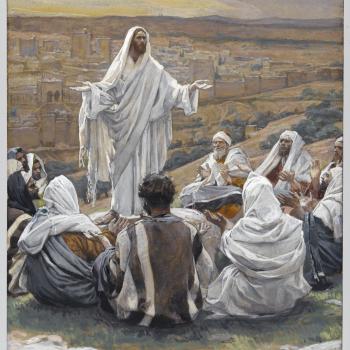If you want to follow Jesus into a new year in new ways with a new heart, it’s hard to imagine a better gospel passage to begin the year with than the Sermon on the Mount. It seems designed to discourage any high-handedness with God or self. Do not try this at home unless you really, really cannot give up Jesus.
It begins with the Beatitudes, which “set the table” for this Jesus business. Plan on deprivation. Dispossession of power or prestige; deprivation of prerogatives, of personal satisfactions, of beloveds; denial of worldly pleasures, of human righteousness. Then the chapter proceeds to describe life situations as they are for everyone: relational brokenness, physical cravings, experiences of brokenness, the inability to control our destinies, victimization and loss, tribalism and competition. If we’ve made it past the Beatitudes and we’re still reading, we learn that we must navigate these real human challenges differently.
We must navigate these assaults as whole people, perfect people. This perfection has very little to do with morality, and everything to do with our vision of God. Such wholeness belongs to and comes from our Father in heaven. The Beatitudes assure us that all these occasions of life–both sun and rain–are part of God’s sovereign purposes of goodness. “Blessed are … for theirs is.” To live with that knowledge at the forefront of our being is to walk in the way of Jesus. It is not about masochism or joyless living; it is instead to choose a greater blessing than we could find if we studiously lived to avoid grief, poverty of spirit, humility, self-denial, and self-righteousness.
But golly, that’s hard. It’s so, so easy to look on deprivation, loss, brokenness, injuries, hunger, dissatisfaction, frustration as signs of: a) no God; b) no God that cares; c) the punishment of God; or d) the perversity or fickleness of God. To read the Sermon on the Mount is to affirm that the way of suffering, of releasing everything into the providence of God, even our well-being, is actually the way of Jesus and the way of blessing.
So, Ludolph urges us, “Do not be wracked by doubt when affliction, trials, and scourges fall upon you; God does not permit them to come to his own unless it be to their advantage.” I remember being more than a wee bit shocked when I first read Dallas Willard‘s statement that “Jesus’ basic idea about this world–with all its evil, pushed to the limit in what he went through going toward and nailed upon the cross–is that this world is a good and perfectly safe place for anyone to be, no matter the circumstances, if they have placed their lives in the hands of Jesus and his Father.” Right.
And yet this is the consensus of the saints. Providence moves in and through disaster. Goodness prevails in every crushing loss. Divine love creates beauty out of ashes.
It’s interesting that Ludolph wrote that paragraph in the context of his commentary about Joseph’s wish to send Mary away. Ludolph reflected on Joseph’s great disappointment of finding that Mary, his beloved, was pregnant, and on his godly desire to protect himself and to protect her. He struggled with doubt, what to do, how to move forward in love and faith.
So, as we launch ourselves into the new year, we must not let ourselves be wracked by doubt. Rather, Ludolph writes, “by weighing these matters carefully, let us make it our business to rein in our hearts and make them firm in the face of adverse circumstances, bearing humbly, patiently, and indeed joyfully with what displeases us.” If we can make that “reining” effort–and yes, it is often exhausting–“we will attain great tranquility of spirit.”














